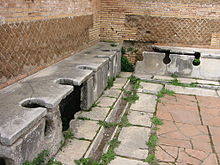
Xylospongium

The xylospongium or tersorium, also known as "sponge on a stick", was a hygienic utensil used by ancient Romans to wipe their anus after defecating, consisting of a wooden stick (Greek: ξύλον, xylon) with a sea sponge (Greek: σπόγγος, spongos) fixed at one end.
The tersorium was shared by people using public latrines. To clean the sponge, they simply washed it in a bucket with water and salt or vinegar. This became a breeding ground for bacteria, causing the spread of disease among those using the latrines such as typhoid and cholera.
In classical antiquity a xylospongium might be used as a toilet brush.
In the baths of the seven sages in Ostia, a fresco from the 2nd century contains the Inscription (u)taris xylosphongio which is the first known mention of the term. Also in the early second century a papyrus letter of Claudius Terentianus to his father Claudius Tiberianus uses the term xylespongium in a phrase.
In the middle of the first century, the Roman philosopher Seneca reported that a Germanic gladiator had committed suicide with a sponge on a stick. According to Seneca, the gladiator hid himself in the latrine of an amphitheater and pushed the wooden stick into his gullet and choked to death.
See also
Citations
Primary sources
- Claudius Terentianus, Michigan Papyri VIII 471 (inv. 5393) = CEL 146 = ChLA XLII 1220 29.
- Seneca, Epistulae morales Liber 8, 70, 20.
- Martial, Epigrammata, Liber 12,48,7.
Secondary sources
- Richard Neudecker: Die Pracht der Latrine. Zum Wandel öffentlicher Bedürfnisanstalten in der kaiserzeitlichen Stadt. Pfeil-Verlag, München 1994 (Studien zur antiken Stadt, Bd. 1) ISBN 3-923871-86-4, pp. 36f.
- Gilbert Wiplinger: "Der Gebrauch des Xylospongiums – eine neue Theorie zu den hygienischen Verhältnissen in römischen Latrinen". In: SPA . SANITAS PER AQUAM. Tagungsband des Internationalen Frontinus-Symposiums zur Technik – und Kulturgeschichte der antiken Thermen Aachen, 18. – 22. März 2009. Frontinus-Gesellschaft e.V. & Peeters, Leiden 2012. ISBN 978-90-429-2661-5. pp. 295–304.
